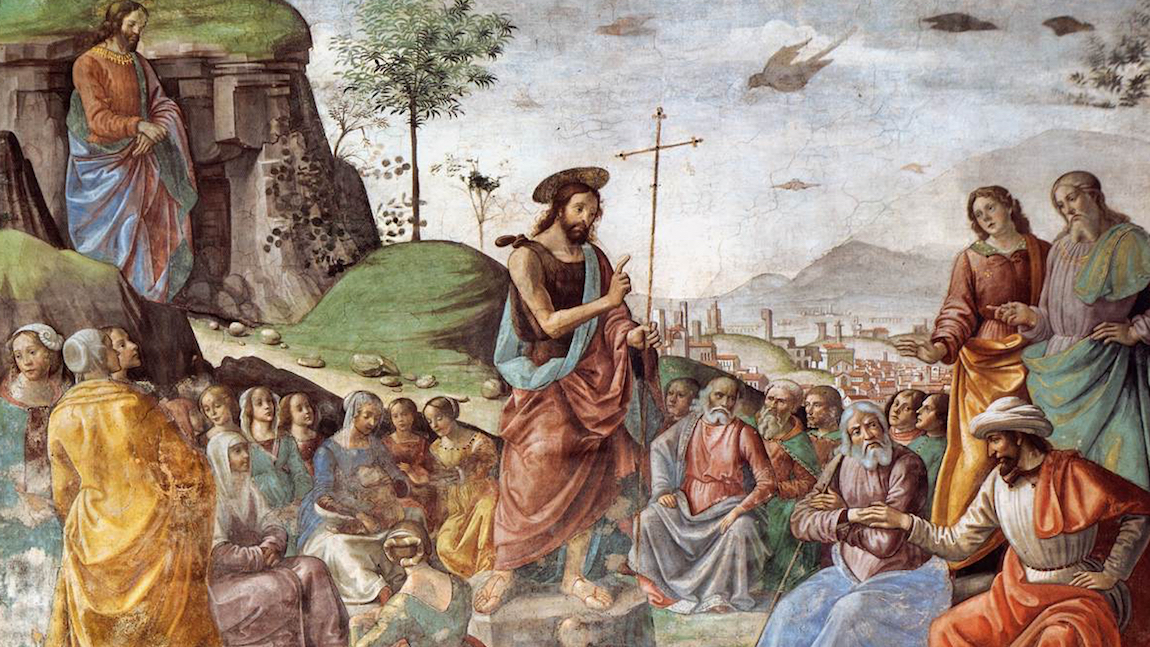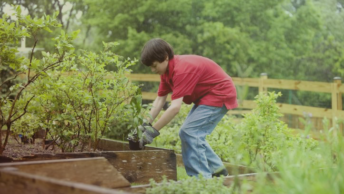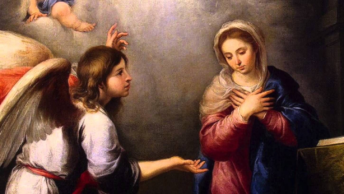The famous psychiatrist Dr. Karl Menninger, in his best-selling book Whatever Became of Sin?, told a story of something that happened in Chicago some years back. A strange and grim-looking man with unkempt long hair and ragged clothes stood on a busy street corner, glaring at the people who walked by. Every now and then he would raise his right arm, point at someone, and shout one word: “Guilty!” Then he’d lower his arm and stand in silence for a while, until he again pointed at someone in the crowd and proclaimed, “Guilty!” One man who had been singled out for judgment by the modern-day prophet turned to his companion and asked, “How did he know?” The answer, of course, is that we’re all sinners, and all guilty of something; therefore, the word “Guilty!” applied to all the people in Chicago that morning, just as John the Baptist’s one-word message “Repent!” applied to all his hearers in Israel 2000 years ago. There is one important difference between these two men, however. The Chicago prophet spoke only of people’s guilt; John the Baptist also spoke of moving beyond guilt and winning God’s favor (Pulpit Resource, Vol. 18, #1—Jan. 1990—p. 8). This distinction is an important one, for John came to prepare the way for Jesus—not by condemning people, but by practicing a form of what we might call “tough love.” John’s message was a hard one, but at the same time a cleansing and liberating one—and it applies more than ever in today’s world. We can only live in God’s truth if we’re willing to admit that absolute truth exists; we can only receive God’s mercy if we’re willing to admit that we’re sinners in need of forgiveness; and we can only be filled with God’s love if we humbly open ourselves to it and share it with others. John offered the diagnosis; Jesus offers the cure—and Advent is a time to prepare ourselves to receive it.
The readings for the Second Sunday of Advent speak of patience and preparation. The prophet Isaiah (11:1-10) was writing several hundred years after the Lord God had promised to bring forth a great and everlasting kingdom from the royal line of David. Most of King David’s descendants, however, were very weak and sinful men, and so Isaiah realized that the Lord’s promise would somehow be fulfilled in the future. Isaiah describes this ideal king as being filled with the spirit of the Lord, a strong and wise ruler who would be a champion of the poor and lowly; his reign would be so peaceful and all-encompassing that even people and wild animals would live together in perfect harmony. Seven centuries later John the Baptist (Mt 3:1-12) announced the imminent coming of this great king—but he stressed the need for people to prepare their hearts through repentance. It was not enough for them to rely on their religious heritage, he said; it was also necessary for them to honestly admit their sins and humbly do penance, for only in this way would they be numbered among the wheat and avoid being thrown into the fire with the chaff. Jesus, of course, established not a temporary earthly kingdom, but a spiritual one which will last forever—and St. Paul (Romans 15:4-9) reminds us that our lives on earth are meant to be a time of preparation for our entry into this kingdom. We need to persevere and endure the difficulties of this life, living in unity and peace and offering each other encouragement and support; in this way we will glorify God’s Name and be ready for the new life to come.
A famous Christian evangelist, Dr. Dwight L. Moody, once visited a prison and spoke to the inmates about Jesus—but he could sense that most of the men weren’t really taking his words seriously. Therefore, he began visiting the prisoners one at a time in their cells, asking each one, “What brought you here?” Again and again, he received replies like: “I don’t deserve to be here”; “I was framed”; “I was falsely accused”; “I was given an unfair trial”; “There are lots of people on the outside who deserve to be here more than me,” and so on. Not one of the inmates would admit he was guilty—until finally Dr. Moody found a prisoner with his face buried in his hands, weeping. “What’s wrong?” he asked, and the man replied, “My sins are more than I can bear.” The evangelist realized this was the man the Lord had sent him to the prison to find, and he began sharing with this prisoner the good news that through Jesus, he could be forgiven and find inner peace (Roy B. Zuck, The Speaker’s Quote Book, p. 183).
Our relationship with Christ makes all the difference; without Jesus, we are sinners—but through Jesus, we are redeemed sinners. This is a huge and vitally important distinction, and it should have a lasting effect on our lives. Jesus has freed us of our sins, and we must bear witness to this truth by the way we live. In particular, I want to mention five characteristics that should be true of us. First of all, we need to be humble. We did not save ourselves, and on our own we would be forever lost in our sins. Every good thing about us, and every good thing we have or can do, is the result of God’s grace—and so we never have reason to give in to pride or to consider ourselves better than others. Secondly, we must be persevering. Salvation is not a one-time event; it’s an ongoing process, and if we’re not careful, we can lose our membership in God’s Kingdom. Spiritual laziness and complacency can have disastrous results, and so we must make a renewed effort to come closer to God every day.
Thirdly, we should be grateful. Jesus was not obligated to come to earth and die for our salvation; He did this freely because of His great love for us. Every day we should thank Him in one way or another—and the best way of doing this is by sharing our faith with others through our words and deeds, our good example, and our prayers on their behalf. Fourthly, we must be forgiving of others. Many times this teaching of Christ is the hardest to practice, but it’s absolutely essential because we ourselves are continually in need of God’s mercy. To pray for the salvation of those who’ve hurt or wronged us is a sign of true Christian love, and the gift of forgiveness which we’ve received is a gift we’re meant to share. Lastly, we must be patient. If we were perfectly sinless, our lives would also be perfect—but that’s not the reality we experience. The Lord’s plan of salvation is unfolding according to His timetable, and our struggles with the difficulties and challenges of life play a part in this plan, including our efforts to overcome sin and temptation with the help of God’s grace. A glorious new life awaits us, and it’s by patiently enduring life here on earth that we are made ready for it.
Being humble, persevering, grateful, forgiving, and patient are all important ways of growing in God’s grace and of living out our faith—and Advent is a wonderful opportunity to recommit ourselves to this effort. The message of repentance proclaimed by John the Baptist leads to the gift of salvation offered by Jesus, and this ongoing challenge and everlasting blessing is offered to each one of us every single day. If ever someone points at us and shouts “Guilty!,” we—as followers of Jesus Christ—can point at ourselves and shout back in response, “Forgiven!”








